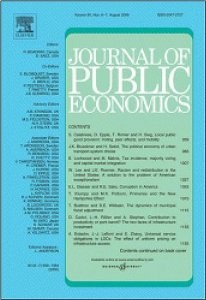
\van Wijnbergen\, S. and Estache, A. (1999). Evaluating the Minimum Asset Tax on Corporations: an Otion Pricing Approach Journal of Public Economics, 71(1):75--96.
-
Affiliated authorSweder van Wijnbergen
-
Publication year1999
-
JournalJournal of Public Economics
King-Fullerton methodology cannot assess the minimum-asset tax because it cannot handle uncertainty. We present an alternative based on option pricing, and show how carryover rules, depreciation conventions, and uncertainty affect the MAT burden. Using Brazilian data, we show (A) because of the high intersectoral variance of returns on capital, the MAT does not reduce sectoral distortions; (B) while high variance raises the MAT burden, high risk firms are not hit harder by the MAT: high-risk firms also have a high rate of return, which reduces the impact of the MAT.